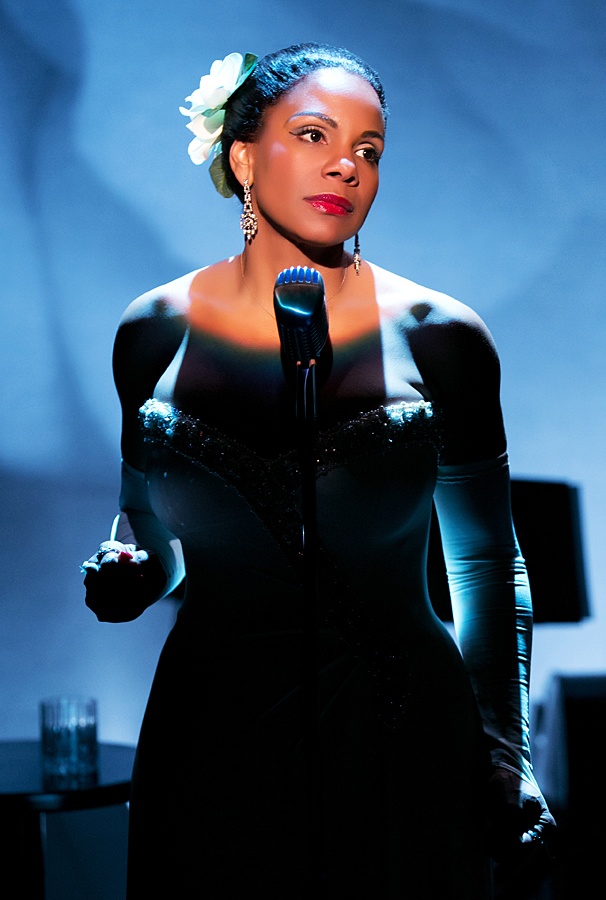| Roundabout takes another chance by casting Sutton Foster in a role against her usual type, and it pays off handsomely. |
Two-time Tony-winner Sutton Foster is virtually unrecognizable in Roundabout's revival of Violet, the 1997 Off-Broadway musical about a disfigured Southern girl on her way to seek a cure from a famous televangelist. Oh, that crystalline belt is unmistakably hers, and in the show's lighter moments we see glimpses of the musical comedienne who wowed in shows like Thoroughly Modern Millie and The Drowsy Chaperone. But for the majority of Violet's intermissionless 110 minutes, Foster completely disappears inside this deeply insecure young woman struggling to make sense of the blows life has handed her, and watching an actress so familiar play so thoroughly against type is positively thrilling. There are plenty of other aspects to recommend in this handsomely staged production, but Foster is the main draw, and it is another high point in her illustrious and prolific stage career.
Violet suffered a horrible accident in her youth, when her father's axe blade flew off the handle and left Violet with a brutal scar across her face. Now grown, Violet has convinced herself that if she places herself in the hands of a nationally famous faith healer, God will heal her disfigurement and she can become the woman she was destined to be. To that end, she hops on a bus toward the site of the Preacher's next big revival, and along the way befriends two soldiers who will play a major role in helping Violet realize what is truly beautiful about her.
It must be said that as a piece of theatrical writing, Violet has some issues. Brian Crawley's libretto skips to different points in Violet's life with a murky logic that at times makes the show more of a mood piece than a coherent book musical. Jeanine Tesori's folk and gospel-influenced score is far more engaging than Crawley's occasionally cloying dialogue, even if several musical numbers overstay their welcome ("Luck of the Draw" and "Raise Me Up" are prime offenders, even if the latter features some thrilling choral work by the hardworking cast of 11). Thankfully for the show and the audience, the strongest section of the show is the last, with the final 30 minutes proving both an illuminating character study and an emotionally satisfying conclusion to Violet's journey. Although the show's message about personal acceptance has become something of a cliché, it is heartfelt and earnestly expressed by both the writing and the cast.
In fact, it is largely due to the first-rate cast that Violet is able to overcome its more questionable plotting decisions and structural weaknesses. As previously mentioned, Foster exceeds expectations as a dramatic singing-actress, in her most surprising and emotionally moving performance yet. The production eschews any kind of make-up, allowing the audience to imagine Violet's horrific scar rather than getting bogged down with actually showing it; thanks to Foster's wholly committed performance, the scar's presence and the accompanying years of psychological baggage are always felt. And while Violet the character can be emotionally guarded and introspective, Foster the actress is open and accessible in a way that anchors and elevates the show and its message of inner beauty triumphing over adversity. Towards the musical's end, one of the characters earnestly tells Violet, "I wish you could see yourself. You look so beautiful." Because of the expert way in which Foster as charted her character's growth, we can see the exact change he's talking about, and it is truly marvelous.
Joshua Henry demonstrates great charisma as Flick, the black soldier who instantly bonds with Violet over the shared hardship of being constantly judged based on their looks. Henry's million-watt smile and soulful voice make his solos soar, and he does an excellent job of creating a fully rounded character from material that leaves a lot unsaid. Colin Donnell is appropriately dashing as Monty, Flick's womanizing companion who completes the central love triangle, although he is occasionally let down by the writing. At times Monty is presented as a legitimate alternative to Flick, while at others he comes across as an opportunist only interested in brief fling. Donnell portrays both options convincingly, which ultimately leaves you feeling unsure about both his character and how we're meant to feel about his eventual fate. Meanwhile, Alexander Gemignani is pitch perfect as Violet's widowed Father, and Emerson Steele is ideally matched with Foster as the adolescent Violet.
Director Leigh Silverman has staged this production with efficiency and an appropriately scaled back physical production. Unfortunately she doesn't always help to clarify what is going on in the show, specifically in regards to the logic behind the time shifts (Violet's current and past incarnations are often both onstage at once, in separate but interlocking scenes that sometimes dissolve into one another). Both David Zinn's set and Clint Ramos' costumes are appropriately unassuming, with enough detail to suggest time and place but not so much that they inhibit suspension of disbelief during the many location changes and scene shifts.
If you're looking for the kind of big, splashy musical that Sutton Foster is usually associated with, Violet is not for you. But it is a lovingly mounted production of a charmingly small-scale musical that tells an interesting and moving story despite some structural shortcomings. Previously confined to the realms of musical comedy, Foster's career redefining performance shows she has the acting skills to tackle more serious musical dramas, opening even more doors for one of the Great White Way's most in-demand leading ladies. Ably supported by her costars, Foster makes Violet a journey worth taking



